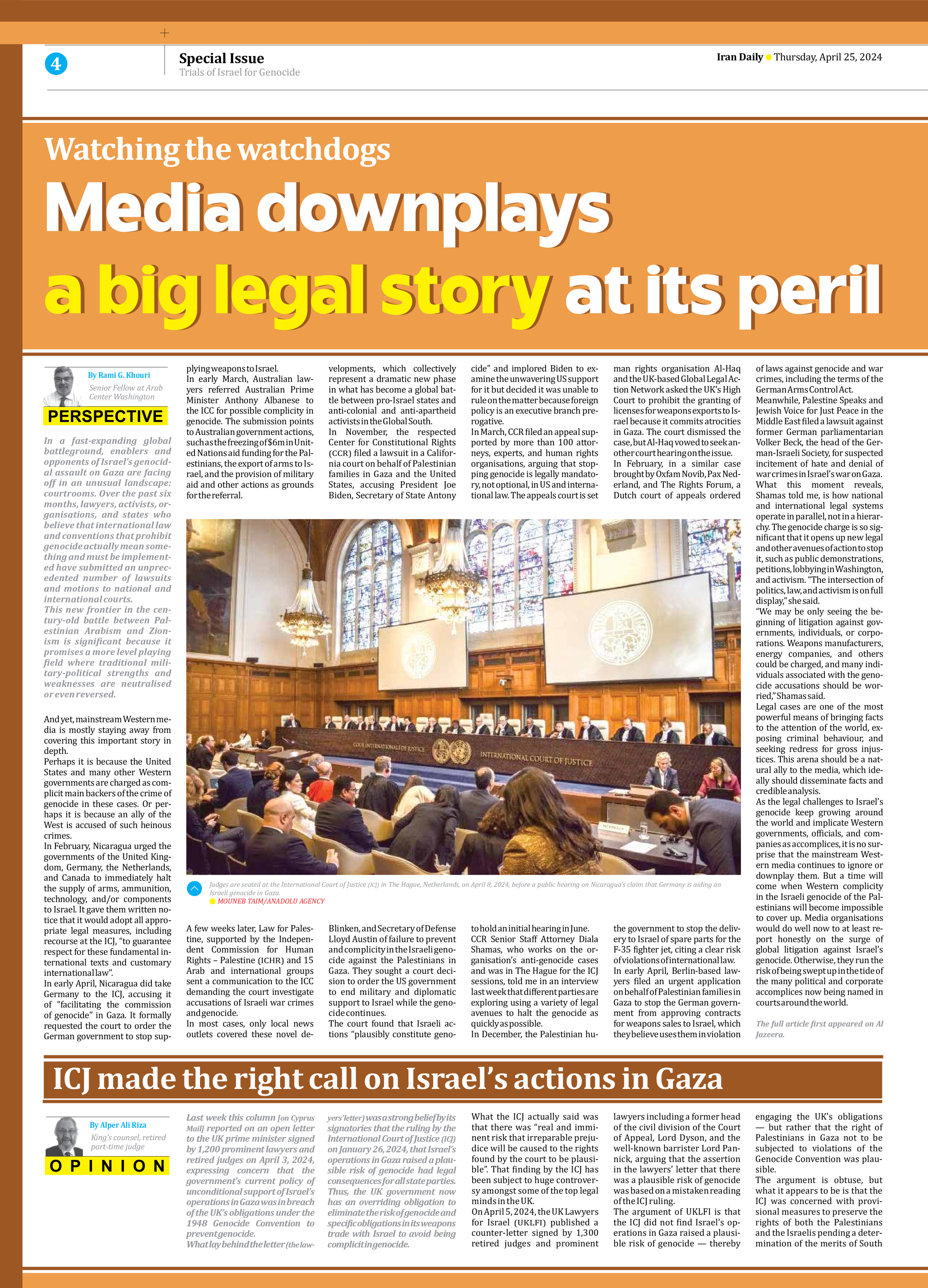
ICJ made the right call on Israel’s actions in Gaza
Last week this column [on Cyprus Mail] reported on an open letter to the UK prime minister signed by 1,200 prominent lawyers and retired judges on April 3, 2024, expressing concern that the government’s current policy of unconditional support of Israel’s operations in Gaza was in breach of the UK’s obligations under the 1948 Genocide Convention to prevent genocide. What lay behind the letter (the lawyers’ letter) was a strong belief by its signatories that the ruling by the International Court of Justice (ICJ) on January 26, 2024, that Israel’s operations in Gaza raised a plausible risk of genocide had legal consequences for all state parties. Thus, the UK government now has an overriding obligation to eliminate the risk of genocide and specific obligations in its weapons trade with Israel to avoid being complicit in genocide.
By Alper Ali Riza
King’s counsel, retired part-time judge
What the ICJ actually said was that there was “real and imminent risk that irreparable prejudice will be caused to the rights found by the court to be plausible”. That finding by the ICJ has been subject to huge controversy amongst some of the top legal minds in the UK.
On April 5, 2024, the UK Lawyers for Israel (UKLFI) published a counter-letter signed by 1,300 retired judges and prominent lawyers including a former head of the civil division of the Court of Appeal, Lord Dyson, and the well-known barrister Lord Pannick, arguing that the assertion in the lawyers’ letter that there was a plausible risk of genocide was based on a mistaken reading of the ICJ ruling.
The argument of UKLFI is that the ICJ did not find Israel’s operations in Gaza raised a plausible risk of genocide — thereby engaging the UK’s obligations — but rather that the right of Palestinians in Gaza not to be subjected to violations of the Genocide Convention was plausible.
The argument is obtuse, but what it appears to be is that the ICJ was concerned with provisional measures to preserve the rights of both the Palestinians and the Israelis pending a determination of the merits of South Africa’s genocide case against Israel. As such, it could not rule there was a plausible risk that Israel was committing genocide in Gaza because that encroached on the merits of the case that was reserved for the full-blown trial.
The UKLFI also criticises the lawyers’ mistaken belief that the ICJ’s provisional measures were binding on the UK, which could not be the case as it was not a party to the proceedings. The lawyers’ letter, however, identifies the Genocide Convention, not the provisional measures, as the source of the UK’s obligations to prevent genocide. It is true that the UK’s obligations derive from the finding by the ICJ of a plausible risk of genocide, but that is not the same as being bound by the courts’ provisional measures.
UKLFI also criticises the lawyers’ letter for ignoring the legal basis of Israel’s operation in Gaza including its inherent right of self-defence, although the UKLFI must know that self-defence cannot justify genocide. Finally, the casualty figures relied on in the lawyers’ letter are questioned as they are provided by Hamas. One can argue about the figures both ways — as an overestimate and an underestimate. The fact, however, is that the death and destruction have been in plain sight for many months and that when the case comes to be tried on the merits, the primary issue is going to be whether Israel intended to destroy the Palestinians in Gaza as a people or whether there were other reasons for the extent of the death and destruction Israel caused in Gaza.
In the UK at this stage, the question is whether the plausibility ruling by the ICJ was to do with Israel’s conduct of operations in Gaza or the plight of the Palestinians or whether, as I believe, they are two sides of the same coin.
After the letter from the UKLFI was published, there was a rebuttal by the team of lawyers of the original letter to the prime minister, which is too elaborate to reproduce but which criticises UKLFI’s analysis as playing with words while the Palestinian people are being subjected to intolerable suffering and destruction by Israel.
In effect, the rebuttal says it is an obvious truism that the risk to the right of possible victims of genocide is plausible and that the court did not need a 17-page judgement to say so. Also, the plausible risk of genocide is consistent with the arguments presented to the court and its criticism of statements made by Israeli politicians for inciting genocide. Finally, there have been later rulings and provisional measures in March 2024 to prevent starvation and prolonged and widespread deprivation of the basic necessities of life, all consistent with the plausible risk of genocide interpretation of the ICJ’s ruling of January 26, 2024.
The ICJ’s role in determining what provisional measures to require pending trial was to make a provisional judgement about the situation in the context of Israel’s operations in Gaza said to have been conducted in self-defence. So far, as the Palestinians in Gaza were concerned, the ICJ sought to arrest their destruction as a people in Gaza by the provisional measures it required of Israel in the conduct of its military operations.
As for the Israelis, the court preserved their right to defend themselves and obtain the release of their citizens held captive in Gaza negatively, by not ordering a cease-fire.
The ICJ could not, however, ignore that the nature and scale of the destruction of Gaza by Israel was prima facie evidence that there was a risk that some elements in the Israeli cabinet harboured an intention to destroy the Palestinians of Gaza by deliberately inflicting on them conditions of life calculated to bring about their physical destruction.
The article first appeared on Cyprus Mail.







